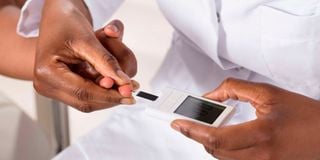Premium
Eye photos could soon tell whether one has diabetes

A doctor checks a patient's sugar level with a Glucometer. Researchers in Kenya are working on a simpler and faster way to predict when a patient has diabetes and hypertension (high blood pressure) by just taking photos of the eye.
What you need to know:
- The non-invasive equipment uses artificial intelligence and has retinal cameras that help analyse a patient’s risk of having diabetes and hypertension.
- The Health Ministry is in talks with the national public insurer NHIF on an inclusive cover for Non-Communicable Diseases.
Researchers in Kenya are working on a simpler and faster way to predict when a patient has diabetes and hypertension (high blood pressure) by just taking photos of the eye.
This comes as the Health ministry says funding for non-communicable diseases like these is low, with Kenya requiring over Sh350 billion in the next five years to tackle them, though only six per cent of that is available.
Using sophisticated equipment donated by AstraZeneca yesterday, about 299 participants have been enrolled in the study, which will be conducted at the Kenya Medical Research Institute (Kemri), the University of Nairobi and the Aga Khan University Hospital.
The non-invasive equipment uses artificial intelligence and has retinal cameras that help analyse a patient’s risk of having the two conditions, rather than having different invasive tests.
The research by the three institutions will authenticate whether the predictive value of the machine is viable.
Non-communicable diseases
Diabetes and hypertension are part of a larger group of non-communicable diseases (NCDs) whose burden is growing.
A 2016 survey showed that 26 per cent of Kenyans were affected by NCDs.
While there is no updated data on the burden, Health Chief Administrative Secretary Dr Rashid Aman told journalists that there is a rise in the prevalence of NCDs and they are likely to overtake infectious diseases such as malaria and tuberculosis.
“They are increasing at a rate that they have even surpassed infectious diseases that we have been burdened with for a long time and the government has taken decisive action by creating a policy and strategy on how to deal with NCDs,” said Dr Aman.
The data gap was yesterday cited by the government and other stakeholders as a key hindrance to tackling challenges related to NCDs.
Researchers from the University of Nairobi appealed to the government to partner with stakeholders to come up with new data and research in the medical field.
Speaking in a panel discussion at an event in Nairobi yesterday, Prof Evelyn Wagaiyu said since the government has most of the information, it should be the driver of the research agenda.
“If we work together, we can achieve more than what we are doing now. We are working in silos now and we need to change that and focus on a more collaborative approach. If that happens, then we can know how to improve on technology,” she said.
Ms Louis Oyunge, a nurse working in Nairobi who was also part of the panel, faulted the government for not considering patients’ welfare, citing inadequate personnel in hospitals and patients missing out on quality treatment because of expenses.
“The process in our hospitals is good, but the end of it all is not as pleasing, as patients may miss out on important medicines as they may be unavailable at facilities,” he said.
Enhanced cover
“When we give patients prescriptions asking them to buy medicine elsewhere, it is quite expensive on their end. I wish we could have an enhanced cover specifically for such patients.”
The Health Ministry is in talks with the national public insurer NHIF on an inclusive cover for NCDs, said Dr Ephantus Maree, director of non-communicable diseases at the ministry.
“It is true that medicine for NCDs in the country is expensive. One of the challenges... was data and we are now working on it. In counties, the challenge was that drugs were bought using the available money and not the burden of disease,” he said.




